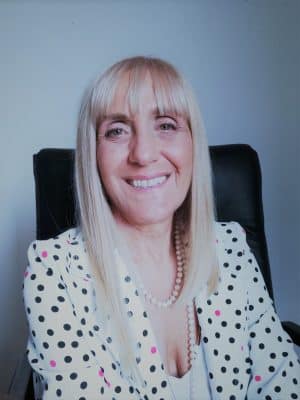We interviewed Caterina Falchi, VP of File Technologies at Cloudian on her experience and thoughts on women in tech.

- What does your job role involve?
As the Vice President of File Technologies at Cloudian I head up the engineering team in Italy and am responsible for this important part of our data storage product family, developing a globally competitive technology hub.
Key aspects of my role also include hiring and nurturing talent, to use my experience in Italy’s technology sector to support new recruits, to teach them, and encourage them to embrace the challenge. The biggest challenge right now is to build a new generation of technology experts who feel the responsibility to improve our technical solutions and make them increasingly competitive.
- What made you choose a career in technology?
I was born in a small village in Sardinia, Italy. My father always wanted more for me than small village life, so he pushed and encouraged me to be the best I could be in school and provided me with every opportunity to learn. The most important thing that his education gave me was self-confidence, which led me to choose my future without setting limits to my possibilities.
When I was younger my dream was to be a scientist – this was a big dream for a girl at the time. I liked technology and wanted to invent something new, which helped pave my way to studying electronic engineering at university.
When I started my career I focused on building my technology skills and honing my knowledge. I spent seven years in a big IT company but found there was no future there for me. I later moved to a smaller company where I spent the next twelve years as a project leader, however again as a woman the problem was the same – there was no future for me there either. It was at this time, at the age of 45, that I decided to take my fate into my own hands and made the best decision of my career – I founded a company along with two associates. I gained sole ownership of the company in 2011, and in 2017 this little Italian company, founded and run by a girl from a small village in Sardinia, would be acquired by a leading American object storage company – proof that passion and hard work will push you to achieve big things.
- Did you study an IT or technology related subject at A-Level or University?
While I spent senior school focusing on Humanity subjects, including Latin, Greek and Philosophy, I already had a great passion for technology and I was later accepted to study electronic engineering at university.
- Did you get any work experience in IT or technology before this role?
During my time at university I taught electronics at the local secondary school to help pay for my studies. Aside from this I did not have prior work experience before securing my first job post-grad.
- Do you think there is a lack of females in the IT and tech sector?
Part of my role throughout my career has been about hiring and training new talent. What is clear in Italy especially, is that there is a lack of people, men too but women specifically, graduating in this field. There is a great future for careers in technology, the world has many problems to solve like pollution, food, and sustainable population growth, for example. All these problems can only be solved thanks to scientific and technological progress, and technology will be at the heart of the solution.
- Do you find there is a stereotype that a career in IT or technology is just for men?
A few years back now, absolutely – the technology industry was a hard place for women. Not because we were not welcome, but the reality was, there was less opportunity and we had to work a lot harder to prove ourselves. This continues to change, but there is still a lot more to be done – what is important now is to not focus on the industry’s past, but instead get the inspiring and empowering message out there to the future women of tech.
I think, like dreams, stereotypes are made very early on in a person’s life and so to prepare these dreams and wash the barriers away we need to start as early as nursery and make every dream and possibility the same for girls and boys. When I was a child I simply could not relate to anything like Cinderella or Snow White, and so no dream or passion was born from these types of concepts for me: my dream was to be a scientist, because I knew that I could realise this dream with a great commitment to study and with passion. At the time, this was a strange dream for a young girl, but now it is our responsibility to make sure this is a perfectly normal and achievable for any girl.
Today I am not a scientist, but I am an inventor, and everything that I am has stemmed from my dreams as a child. I truly believe if you are passionate about something you will do what is necessary to achieve your goal.
- What would entice women to study technology related courses?
The future of technology needs to be creative – it needs imagination, and math and science won’t be enough, rather the skills required are multifaceted. I studied Latin, Greek and philosophy before I moved on to study technology and this has been a huge asset throughout my whole career. These humanity subjects taught me to think and approach problems from different angles, so when I went on to invent my product I addressed the challenge in a totally different way to most developers – my idea was unique and became a successful idea.
It is important to study and acquire competence and know how, but I think there needs to be more fluidity between subjects rather than having to choose to study just one. Merging subjects – science, technology, engineering, math and the humanities – will be greatly beneficial to the future of the technology industry by enabling people to create and invent new solutions. There is art in technology and inventing, it is not just technical, it is very creative. By identifying the creativity in the subject we will encourage many young girls who are hesitant to study technology because of the technical aspect, to reconsider the possibility.
- Are there barriers when it comes to women getting into tech?
At the start of my career this was absolutely a problem. But I think the light has been shone on the lack of women in the technology industry and a lot is being done to change this. There is a real shortage of people choosing technology, and of those who do, even fewer have the passion and drive to achieve big goals.
I believe this has opened up a lot of opportunities within the industry for anyone, but especially women – not only as an opportunity to make a significant contribution to the industry, but at the same time it will give many women the opportunity to achieve ambitious and highly successful professional goals.
- How could we encourage more women to start a career in tech?
I think the introduction to technology needs to start early and needs to be light – the message should never be that technology is too hard for girls. I think many girls worry that this area is too difficult – we need to change this perception.
It should be remembered that in some cases the education of girls does not lead them to have much confidence in themselves. The parents too can be overly cautious of these subjects being too challenging or not very ‘girly’ and so girls are not then encouraged or pushed towards STEM. We need to show girls that anyone can be a scientist, a technologist or a mathematician. And for this reason, the stories of successful women must be presented as stories of ordinary women who believed in themselves and overcame their challenges.
Furthermore, we need to show young children that technology is fun and easy and, if they concentrate and study, can offer an exciting and rewarding future. It is our job to show them that technology is exciting and ignite passion rather than extinguish it – the rest will naturally follow.







